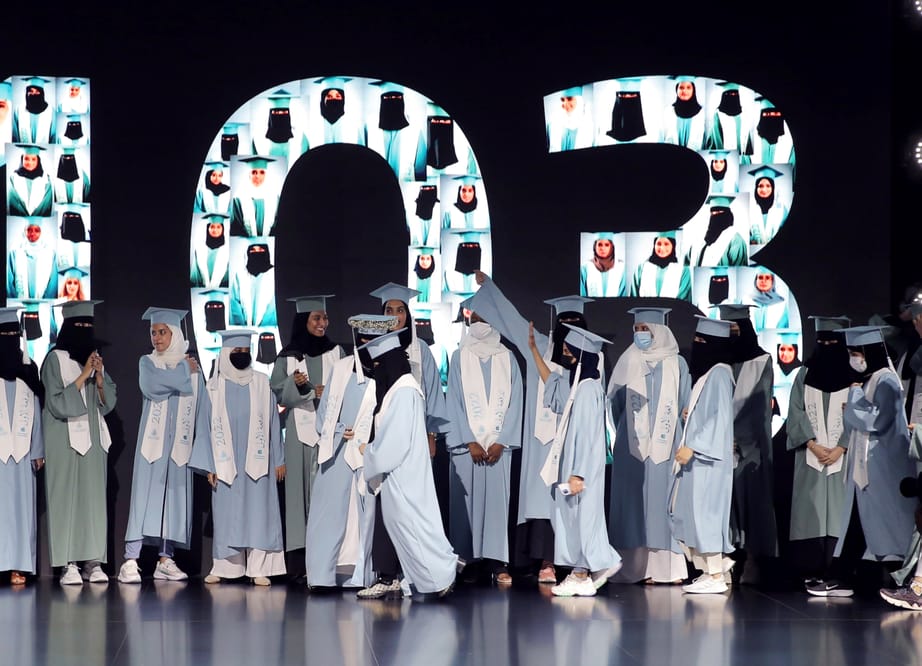
Upskilling A Nation
To achieve its technological ambitions, Saudi Arabia is taking bold steps in talent development for tomorrow’s economy Artificial intelligence

With education, mentorship, collaborations, and more, here’s how Saudi Arabia is attempting to close the gender gap in AI
The conversation around gender disparity in artificial intelligence (AI) is not new. The industry has traditionally been male-dominated, and it’s been plagued by similar issues related to gender diversity that other industries have also faced.
Alanoud A. Alabdulwahed, General Manager, Technology Adoption and Growth at Saudi Arabia’s Ministry of Communications and Information Technology (MCIT), said, “AI and data science are shaping the future, and these fields will play a major role in careers in the coming years. Ensuring women have equal opportunities in these fields is essential.”
And it’s fair to say that the landscape is shifting in Saudi Arabia. The country has made big strides in increasing female participation in technology and AI. According to Endeavor Insight, in the third quarter of 2021, the participation of women in the technology sector in Saudi Arabia was 28%, which was more than 10% above the European average of 17.5%.
This progress can be credited to concerted efforts by the government as well as the private sector and educational institutions to lay a strong foundation for gender inclusivity in the workplace. By investing in education, mentorship, and funding for female-led AI ventures, the Kingdom is setting a precedent to follow.
“Gender diversity in AI and technology will help provide more innovative solutions,” Alabdulwahed noted. “Studies have shown that companies with teams that have both genders drive higher levels of innovation and accelerate product development. Increasing female participation isn’t just about equality; it’s about strengthening the economy and the future of AI.”
It’s important to note here that fixing gender bias in AI isn’t a women-specific problem – it’s an imperative need for the betterment of society as a whole. As a report by European think tank Interface noted: “As AI becomes increasingly central to innovation and economic growth, we’re essentially operating at partial capacity… Increasing the number of women in AI is not just about equity – it’s about meeting the pressing need for more AI specialists overall.”
Creating Opportunities
According to Alabdulwahed, there has been an improvement in the number of women participating in the field of AI in Saudi Arabia since the announcement of Vision 2030. “In the past few years, we’ve seen improvements in encouraging and empowering women to pursue careers in technology, including AI,” she said. “Back in 2018, the percentage of women in technology in Saudi Arabia was around 7%. Today, as of 2024, that number has jumped to approximately 35%, which is higher than both the G20 average and Silicon Valley’s average. This growth is the result of continuous efforts to create more opportunities for women in the field, and it is a representation that women in KSA has already proven their capability and ambition to lead in this race. Also, as an example, in my team, women and men share an equal distribution around 50%, and this was a result of fair competition and the growth of skills.”
The Kingdom’s commitment to gender diversity in AI can be seen through a series of governmentbacked initiatives. The Saudi Data and Artificial Intelligence Authority (SDAIA) and the MCIT, for example, both have been instrumental in creating opportunities for women in AI. One notable program driving this change is Elevate, launched by SDAIA, which was designed to upskill AI talent, with a particular emphasis on increasing female participation in the sector. Having launched in 2022, more than 25,000 women are set to be trained in the fields of data and AI over five years by SDAIA’s Elevate initiative.
The first phase of the Elevate program saw it collaborate with Google Cloud with the aim of training 1,000 women across 28 countries in data and AI. The program offered complimentary training sessions across various skills, including cloud engineering, data engineering, machine learning (ML) engineering, and cloud business. The goal was clear: it was to empower women in emerging global markets to pursue new jobs in AI and ML, and help close the gender gap in STEM.
Saudi Arabia’s commitment to ensuring inclusion in AI has been noted by women in the country’s tech ecosystem. “The Kingdom’s strategic initiatives, backed by Vision 2030, are not only fostering participation, but are actively propelling women into leadership roles in technology and AI,” said Emon Shakoor, who’s the founder and CEO of Blossom Accelerator. Based out of Riyadh, Blossom Accelerator partners with startups, corporations, and governments to foster transformative change, with a strong commitment to inclusion in all its initiatives. “Programs offered by organizations like Blossom Accelerator are instrumental in creating pathways for talent to flourish,” Shakoor noted.
Saudi Arabia’s MCIT has also attached significant importance to empowering women in the sector, and doing so is one of the pillars of its communications and information technology sector strategy. The private sector has also been leading the movement through different programs to help grow the capabilities of women and support their hiring. Companies have launched female-focused programs as well as organizational committee and platforms to encourage women to grow their skills and overcome challenges as well. Plus, MCIT’s women empowerment programs aim to raise awareness about the opportunities available to women in the field, while also training and qualifying women in digital and future skills. Additionally, women entrepreneurs in this sector are encouraged to innovate and launch their technical projects.
Indeed, efforts toward supporting female entrepreneurs and female-led startups are growing in KSA - an example here would be the Women in Tech Saudi Acceleration Program. An initiative led by Standard Chartered Bank and Falak Investment Hub, it aims to support women-led startups in the Kingdom by promoting female founders’ economic and social development through techfocused entrepreneurship. One of the most important goals, however, is to increase women participation in the labor market.
“At MCIT, we are committed to encourage women in technology through training and collaboration with various companies,” Alabdulwahed said. “These collaborations help accelerate women’s skills, and ensure that they receive equal opportunities in hiring based on their capabilities. Over the past few years, opportunities for women have increased across both the private and public sectors.”
Alabdulwahed also noted that the private sector has also been leading the movement through different programs to help grow the capabilities of women and support their hiring. Companies have launched female-focused programs as well as organizational committee and platforms to encourage women to grow their skills and overcome challenges as well. She also noted that there have been several initiatives, starting with universities, to open up more opportunities for Saudi women in technology. “Many universities have introduced AI-specific tracks, such as those at Princess Nourah University (PNU) and Prince Sultan University (PSU),” she said. “These institutions are actively developing programs that focus on AI, data and technologyrelated fields.”
Beyond university education, there are also initiatives to connect female students with opportunities in the private sector, said Alabdulwahed. “After graduation, programs like SDAIA’s Elevate and those by various technology companies like the Apple Development Academy at TUWAIQ (the only all-female academy in the world) provide further support to help women build their capabilities and prepare for the job market,” she said.
Women in Saudi Arabia are not just benefiting from AI initiatives, rather, they are also driving innovation. Through her line of work, Shakoor has witnessed several women-led AI startups emerge in recent years, with these companies leveraging AI to solve real-world challenges. She highlighted that the Kingdom now has several female entrepreneurs who have made a mark in this domain. “In the realm of female-led or femalemajority AI startups, notable ventures such as Tarkeez, Truelli, Mawsim, and Hyyak exemplify the Kingdom’s spirit of entrepreneurship,” Shakoor said, while also pointing out that these companies went through Blossom Accelerator’s programs, and have since been able to successfully enhance their visibility and growth in a competitive landscape.
The Road Ahead
There’s no question that Saudi Arabia’s AI sector is set to witness marked changes through the continued support of both the public and private sector. And if AI is used as a leveler, there is much that can be achieved when it comes to closing the gender gap.
Shakoor said, “AI serves as a catalyst for inclusivity in the tech landscape of Saudi Arabia. By harnessing AI-driven solutions for recruitment and training, new standards for equitable access in the workforce are being established. Innovative educational programs are being developed to empower women and equip them with the skills needed to excel in technology.”
Shakoor is also of the opinion that Saudi Arabia is well on its way to closing the gender gap in AI. She said that a surge in collaborative platforms is anticipated, which shall foster both community and innovation among women. “The growing trend of investment in female-led startups, bolstered by support from accelerators like Blossom, will further accelerate the Kingdom’s trajectory as the number one country for inclusion in AI,” she said.
According to Shakoor, what is essential for continued support for women – especially for female entrepreneurs in AI- is a multifaceted approach. “This includes accessing the Blossom Accelerator network for targeted outreach, mentorship programs, partnerships with local and international universities, piloting proof of concepts with corporates, and closing investments rounds to further propel innovations,” she said. “Collaborations with accelerators like Blossom enhance these efforts, creating fertile ground for female innovators to connect with the resources and guidance they need.”
Alabdulwahed pointed to mentorship – among other factors – as being crucial for supporting women in this field. “Connecting women with senior professionals – both female and male – can help them navigate the industry, gain confidence, and overcome obstacles in AI and technology,” she said. “Encouraging women to take on real-world challenges is also important. When they work on impactful projects, whether solving industry problems, or contributing to meaningful societal issues, it motivates them to continue in the field. Participation in competitions, problem-solving initiatives, and industry challenges can make a real difference. We also need to raise awareness, so that women are not afraid to take on opportunities and challenges in AI.”
Shakoor concluded, “Saudi Arabia is not just participating in the global conversation about inclusion in AI; it is leading the charge. With its unparalleled growth and commitment to empowerment, the Kingdom is firmly positioned as the number one nation in fostering a diverse and innovative tech landscape that champions female talent and propel startups forward.”
Discover the most outstanding articles.اكتشف أبرز المقالات.

Harnessing the power of digital twins to reimagine cities across the KSA and beyond. According to PwC’s 2022 report,

How Riyadh-based The Garage is contributing to a flourishing startup culture in Saudi Arabia In the heart of Riyadh, nestled

Saudi astronauts Rayyanah Barnawi and Ali Alqarni make history in giant leap for the kingdom. From earthbound dreamers to cosmic